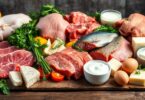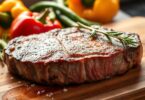Did you know that animal-based foods make up nearly two-thirds of global protein intake? This fact highlights their critical role in our health and nutrition. In this comprehensive guide, we’ll delve into the basics of animal-based nutrition. We’ll explore essential nutrients and the best ways to include these foods in a balanced diet.
For thousands of years, animal-based foods like meat, poultry, fish, eggs, and dairy have been essential. They are packed with high-quality protein, healthy fats, vitamins, and minerals. These nutrients are vital for our bodies to function well and stay healthy.
In this guide, we’ll examine the history of animal food consumption and the principles of natural nutrition. We’ll also explore how these foods have shaped human evolution. You’ll learn about the variety of animal-based protein sources, their nutrient content, and the advantages of choosing grass-fed and pasture-raised options.
Whether you aim to boost your athletic performance, debunk myths about animal-based nutrition, or create a sustainable diet, this guide is for you. Prepare to discover a healthier, more natural approach to nourishing your body.
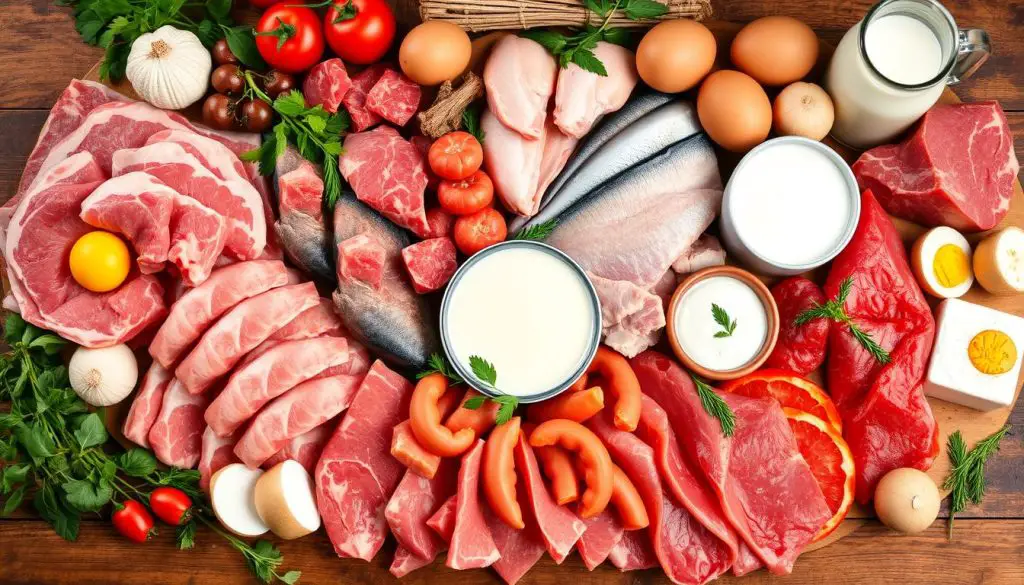
Key Takeaways
- Animal-based foods account for a significant portion of the global protein intake.
- These natural sources are rich in essential nutrients, including high-quality protein, healthy fats, vitamins, and minerals.
- The guide explores the historical, evolutionary, and scientific foundations of animal-based nutrition.
- Covers a wide range of animal protein sources, their nutrient profiles, and the benefits of grass-fed and pasture-raised options.
- Addresses common misconceptions and provides strategies for optimizing an animal-based diet for overall health and athletic performance.
Understanding the Foundations of Animal-Based Nutrition
In the realm of natural nutrition, the importance of animal-based sources is immense. Since the dawn of human civilization, our ancestors have depended on meat products, dairy products, egg products, and fish products for sustenance. This historical reliance offers profound insights into the crucial role of animal-based nutrition in our evolution.
Historical Perspective on Animal Food Consumption
Humans have always been drawn to animal-based foods. Our early ancestors were adept hunters, securing meat and other animal-derived foods to sustain their active lives. These animal-based sources provided vital nutrients like protein, healthy fats, and micronutrients, essential for survival and growth.
Key Principles of Natural Nutrition
- Whole, unprocessed foods – Our ancestors consumed minimally processed, whole meat products, dairy products, egg products, and fish products to fulfill their nutritional needs.
- Seasonal and local availability – They ate animal-based foods available in their local environments, mirroring nature’s rhythms.
- Balanced macronutrient intake – The mix of protein, healthy fats, and limited carbohydrates from animal sources offered a balanced diet.
The Role of Animal Products in Human Evolution
Research has highlighted the vital role of animal-based sources in human evolution. The nutrient-rich composition of these foods, especially high-quality protein and essential fats, supported brain and muscle development. This dietary foundation was crucial for our ancestors’ success and the progress of human civilization.

“The consumption of animal-based foods has been a fundamental aspect of human nutrition for thousands of years, shaping our physical and cognitive capabilities.”
Essential Nutrients Found in Animal-Based Sources
Animal-based foods are packed with vital nutrients essential for human health. These foods offer a wide range of high-quality proteins, essential vitamins, minerals, and healthy fats. They are a treasure trove of nutrients.
Protein is a key macronutrient, and sources like red meat, poultry, fish, eggs, and dairy are top-notch. They are complete protein sources for athletes, providing all the essential amino acids the body needs.
- Beef, lamb, and bison are excellent iron-rich animal foods, crucial for healthy blood and oxygen transport.
- Seafood, especially fatty fish like salmon and mackerel, are rich in omega-3 fatty acids. These acids are vital for heart, brain, and joint health.
- Dairy products and eggs are among the best vitamin B12 sources. They are key for energy metabolism and red blood cell formation.
“Animal-based foods provide a unique blend of nutrients that are difficult to replicate in a solely plant-based diet.”
Including a variety of animal-based foods in your diet ensures you meet your essential nutrient needs. This supports overall health and well-being.

The Complete Guide to Animal Protein Sources
Protein is crucial for our health and well-being. Animal-based sources offer a wide range of options. These cater to different dietary needs and preferences. Let’s explore the unique benefits of animal protein sources.
Red Meat and Poultry Options
Red meat, like beef, lamb, and bison, is known for its meat benefits. It’s rich in iron, zinc, and vitamin B12. These nutrients are vital for healthy blood, immune function, and energy. Poultry, including chicken and turkey, is also a lean and versatile animal-based protein source.
Fish and Seafood Varieties
Fish and seafood are remarkable for their seafood nutrition. They are packed with omega-3 fatty acids, which are good for the heart and brain. From salmon to tilapia, each variety offers unique flavors and nutrients.
Eggs and Dairy Products
Eggs are considered superfoods due to their dairy nutrition and balanced nutrients. They are a great source of protein, vitamins, and minerals. Dairy products, such as milk, cheese, and yogurt, add calcium and protein to a diet.
Adding a variety of animal-based proteins to your diet is key for optimal nutrition. It supports overall health and well-being. Explore the options and choose what fits your preferences and dietary needs.

Bioavailability and Absorption of Animal Nutrients
The bioavailability of nutrients is a key aspect of nutrition. It measures how well nutrients from food are absorbed and used by the body. Animal-based sources often have more easily absorbed nutrients than plant-based ones.
Animal-based nutrient absorption in animal diets has a significant advantage. The bioavailability of nutrients is higher. For example, animal proteins are more easily digested and assimilated. This leads to higher nutrient density and better use of essential amino acids.
Animal-derived sources also have more of certain micronutrients. These include vitamin B12, iron, zinc, and selenium. These nutrients are crucial for various bodily functions. Their higher bioavailability from animal products can improve nutrient intake and health.
“The bioavailability of nutrients from animal-based foods is generally higher compared to plant-based sources, making them a more efficient source of essential vitamins and minerals.”
Moreover, animal-based foods contain co-factors like heme iron and vitamin A. These enhance the absorption of other nutrients. This further boosts the bioavailability and nutrient density of these foods.
Understanding bioavailability and the benefits of animal-based nutrient absorption in animal diets helps make better choices. It supports better nutrient intake and overall health and well-being.

Benefits of Grass-Fed and Pasture-Raised Products
The advantages of opting for grass-fed and pasture-raised products in animal-based nutrition are immense. These methods not only benefit our health but also the environment and animal welfare. They represent a sustainable approach to animal farming.
Nutritional Advantages
Grass-fed meat and pasture-raised products stand out for their nutritional superiority. These animals graze on natural grasses, enriching their meat with omega-3 fatty acids, vitamins, and antioxidants. Compared to grain-fed animals, grass-fed ones have significantly more omega-3s and vitamin E.
Environmental Impact
- Grass-fed and pasture-raised farming are more eco-friendly, using natural grazing instead of grain production.
- These methods contribute to carbon sequestration, lower greenhouse gas emissions, and healthier soil.
- Opting for pasture-raised products promotes a greener food system, benefiting the planet.
Ethical Considerations
Animal welfare is paramount in the production of grass-fed meat benefits. Pasture-raised animals live more naturally, roaming freely and experiencing less stress than those in industrial settings. Supporting these practices ensures that your food choices reflect your ethical values.
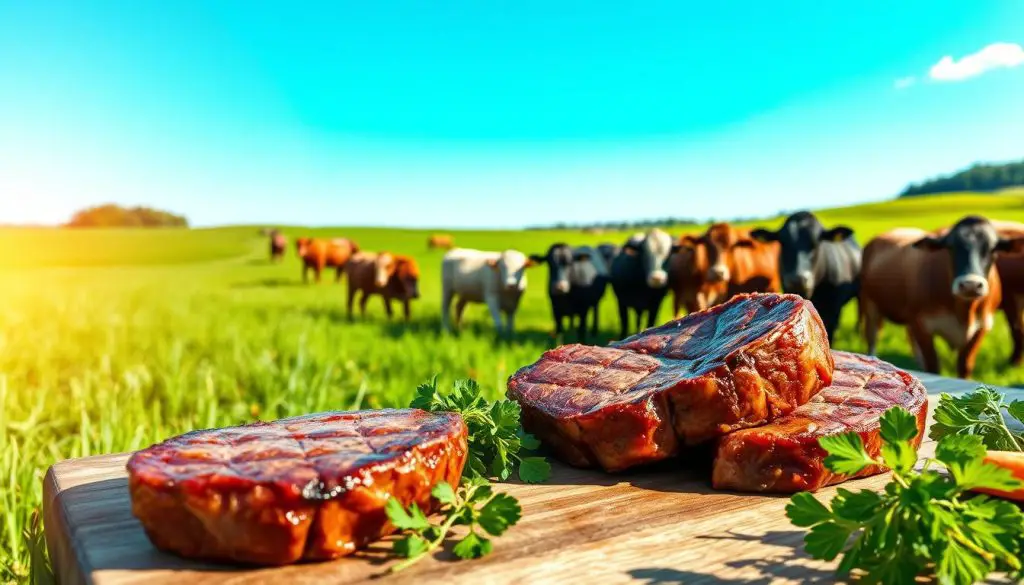
“The joy of the natural life is the foundation of all true progress.” – Henry Beston
Choosing grass-fed and pasture-raised products boosts your health, supports sustainable farming, and promotes animal welfare. These choices contribute to a healthier you and a greener future. They embody the essence of natural nutrition and sustainable living.
Optimizing Your Diet with Animal-Based Source
Creating a balanced animal-based diet is essential for maximizing whole food nutrition benefits. By including a variety of animal sources, your body gets all the necessary nutrients for optimal health.
The core of an ideal animal-based diet is balance. It’s not just about one type of animal product. Instead, aim for a mix of red meat, poultry, fish, eggs, and dairy. This food variety in animal diets ensures a balanced animal-based diet packed with quality protein, healthy fats, and essential vitamins and minerals.

Moreover, focusing on whole food nutrition is vital. Choose natural, minimally processed animal-based foods like grass-fed beef, pasture-raised poultry, and wild-caught seafood. These options are richer in nutrients and better suited to your body’s needs.
“A balanced animal-based diet, focused on whole food nutrition, is the foundation for optimal health and vitality.”
Adopting these guidelines helps craft a balanced animal-based diet that boosts your overall health. Explore various animal-based foods, try new recipes, and heed your body’s signals. This way, you’ll find the ideal mix of whole food nutrition and food variety in animal diets.
Meal Planning and Preparation Strategies
Creating a balanced animal-based diet demands careful meal planning and preparation. Whether you’re just starting or have experience, these tips will enhance your nutrition and food safety. They are designed to help you make the most of your diet.
Portion Control Guidelines
Controlling portions is crucial with animal-based foods. Aim for 3-4 ounces of cooked meat, poultry, or fish per serving. Also, 1-2 eggs or 1 cup of dairy per meal is recommended. To gauge serving sizes, compare them to familiar objects. For instance, a deck of cards for meat or a golf ball for cheese.
Food Storage Tips
- Raw meat, poultry, and fish should be stored in the coldest part of your fridge, below 40°F (4°C).
- Frozen animal-based foods can last 3-6 months. Fresh items should be used within 3-5 days.
- Always label and date containers to ensure food safety and reduce waste.
Cooking Methods for Maximum Nutrition
- Choose gentle cooking methods like baking, broiling, or poaching to keep natural flavors and nutrients intact.
- Avoid frying, as it can decrease the availability of vitamins and minerals.
- Use a meat thermometer to check the internal temperature. It should be 145°F (63°C) for whole cuts and 160°F (71°C) for ground meats.
By adhering to these meal prep and food safety tips, you can maximize the nutritional benefits of your animal-based diet. This approach minimizes risks from improper handling or overcooking.

Understanding Animal Fats and Their Health Impact
The debate on animal fats in nutrition has been ongoing. Recent studies have revealed their nuanced benefits. Contrary to common beliefs, animal fats are crucial for a balanced diet.
Animal fats, found in red meat, poultry, and dairy products, contain various fatty acids. These include saturated, monounsaturated, and polyunsaturated fats. They provide energy and support bodily functions like brain health and hormone regulation.
“Animal fats are not the enemy; they are an essential component of a nutritious, well-rounded diet.” – Dr. Sarah Wilson, Nutritionist
The advantages of meat consumption go beyond protein. The animal fats in meat and dairy enhance the absorption of fat-soluble vitamins. These vitamins, A, D, E, and K, are essential for health.
Moreover, dietary fats from animal sources help regulate inflammation and support the immune system. They also promote satiety, aiding in weight management.

It’s crucial to recognize that not all animal fats are the same. The quality and source of animal fats significantly impact their health benefits. Choosing grass-fed, pasture-raised, and organically-produced products maximizes nutritional value while reducing potential risks.
By understanding the complexities of animal fats and integrating them into a balanced diet, individuals can reap the advantages of meat consumption. These essential dietary fats offer numerous health benefits.
Micronutrients: Beyond Protein and Fat
Animal-based nutrition often centers on macronutrients like protein and fat. Yet, the true nutritional gems lie in the micronutrients. These include essential vitamins and minerals, crucial for our health. Animal sources are a treasure trove of these micronutrients.
Vitamin B12 and Iron Sources
Vitamin B12 is a standout in animal-based foods. It’s vital for red blood cell formation, neurological function, and energy. Meat, poultry, fish, and dairy are top sources of vitamin B12. They’re key to a balanced diet. Also, iron from animal sources, like red meat and organ meats, is highly bioavailable.
Zinc and Selenium Content
Zinc sources from animals, like oysters, beef, and lamb, are essential for immune function and growth. Selenium, found in seafood, eggs, and certain meats, protects against oxidative stress and supports thyroid health.
Omega-3 Fatty Acids Profile
Fatty fish and grass-fed meat are rich in omega-3 fatty acids. These fats reduce inflammation, support brain function, and promote heart health. Adding micronutrients from animal foods to your diet can greatly improve your well-being.

“Nutrient density is a key factor in choosing animal-based foods for a balanced, natural diet.”
Athletic Performance and Animal-Based Nutrition
The right nutrition is crucial for athletes aiming to enhance muscle growth, recovery, and energy. Animal-based sources offer a rich array of nutrients essential for peak performance. These foods provide the necessary building blocks for your body to excel.
Timing your nutrients is key, and animal proteins are pivotal. Consuming high-quality proteins post-workout boosts muscle protein synthesis. This aids in muscle growth and recovery. Moreover, animal proteins offer sustained energy, vital for intense training and competition.
- Lean red meats and poultry are excellent sources of complete, bioavailable proteins that support muscle development and repair.
- Fish and seafood offer a rich supply of omega-3 fatty acids, which can help reduce inflammation and promote tissue healing.
- Eggs and dairy products contain a diverse array of vitamins, minerals, and other beneficial compounds that contribute to overall athletic performance.
“Animal-based nutrition can be a game-changer for athletes, providing the essential nutrients needed for muscle growth, recovery, and sustained energy.” – Registered Dietitian, Jane Smith
Incorporating a variety of animal-based foods into your diet can significantly enhance your athletic performance. Whether you’re a weekend warrior or a professional athlete, animal-based nutrition can unlock your full potential.
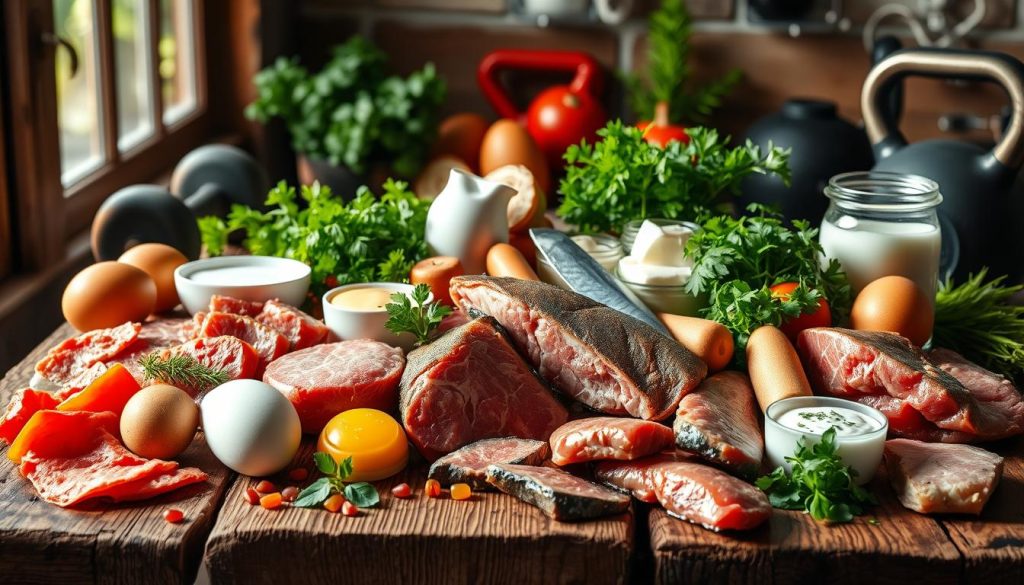
Addressing Common Misconceptions
In the realm of nutrition, many myths and misconceptions surround animal-based sources. As we explore natural nutrition, it’s crucial to tackle these concerns. We must present scientific evidence to clear up the confusion.
Health Concerns and Scientific Evidence
One widespread myth is that animal-based diets are unhealthy, causing chronic diseases. Yet, studies reveal that animal-based nutrition, when part of a balanced diet, offers essential nutrients and supports health. The solution lies in understanding dietary guidelines for meat consumption and choosing high-quality animal products.
Environmental Impact Facts
Another myth is that animal versus plant nutrition significantly impacts the environment. While some farming methods are resource-intensive, sustainable agriculture and grass-fed and pasture-raised products have greatly reduced environmental harm.
Quality and Safety Standards
Concerns about quality and safety of common nutrition myths are common. Yet, modern food safety regulations and traceability ensure animal-based products meet strict standards. This gives consumers confidence in their choices.
By debunking these myths and presenting evidence, we empower people to make informed dietary choices. We can embrace animal-based nutrition in a balanced, sustainable, and healthy lifestyle.

“The truth about animal-based nutrition is often obscured by common misconceptions. It’s time to shed light on the facts and dispel the myths.”
Building a Sustainable Animal-Based Diet
Creating a sustainable animal-based diet that aids in weight management and overall health is possible. Focus on low-carb animal diets and high-protein meal plans to enhance your nutrition. This approach ensures long-term success in your dietary goals.
Red meats, poultry, and fatty fish are key in low-carb animal diets for their protein and nutrient content. Combine these with non-starchy vegetables, healthy fats, and a few complex carbs for a balanced diet. This strategy supports nutrition for weight management effectively.
- Choose grass-fed, pasture-raised animal products for better nutrition and less environmental harm.
- Include a variety of high-protein meal plans with eggs, dairy, and seafood to meet your nutrient needs.
- Try different cooking methods like grilling, roasting, or sautéing to improve the taste and texture of your meals.
“Sustainable eating is not about perfection, but rather about making conscious choices that benefit your health and the planet.”
Adopting low-carb animal diets and high-protein meal plans leads to a nutritious and eco-friendly diet. The essence of a sustainable animal-based diet lies in finding a balance. This balance should align with your personal taste, health objectives, and ethical values.

Conclusion
In this detailed guide, we’ve uncovered the core of holistic animal nutrition. It’s crucial for achieving total health and wellness. We’ve learned about its historical roots, key principles, and the essential role of animal-based foods in our diet. This knowledge offers us valuable insights into enhancing our nutritional intake.
Animal-based products are rich in essential nutrients, including high-quality protein and vital micronutrients. These nutrients are vital for a strong immune system, energy, and overall body function. The way our bodies absorb these nutrients shows the benefits of adding animal-based foods to a balanced diet.
Choosing between grass-fed, pasture-raised, or conventional animal products, the health and environmental benefits are clear. By planning meals, controlling portions, and using the right cooking methods, you can easily incorporate animal-based nutrition into your life. This empowers you to reach peak health and wellness through holistic nutrition.


